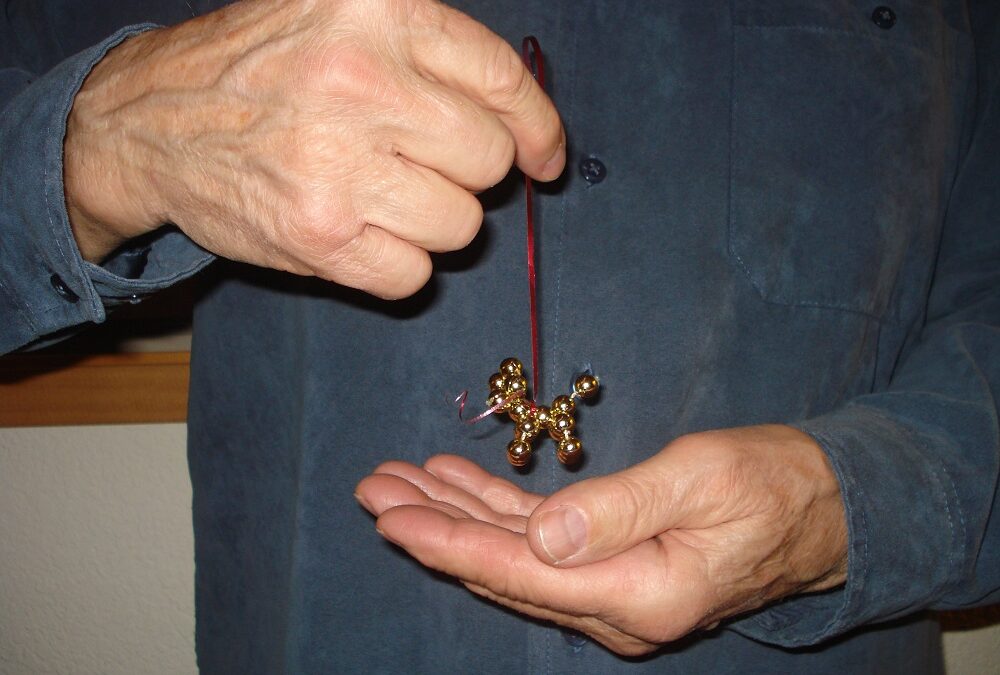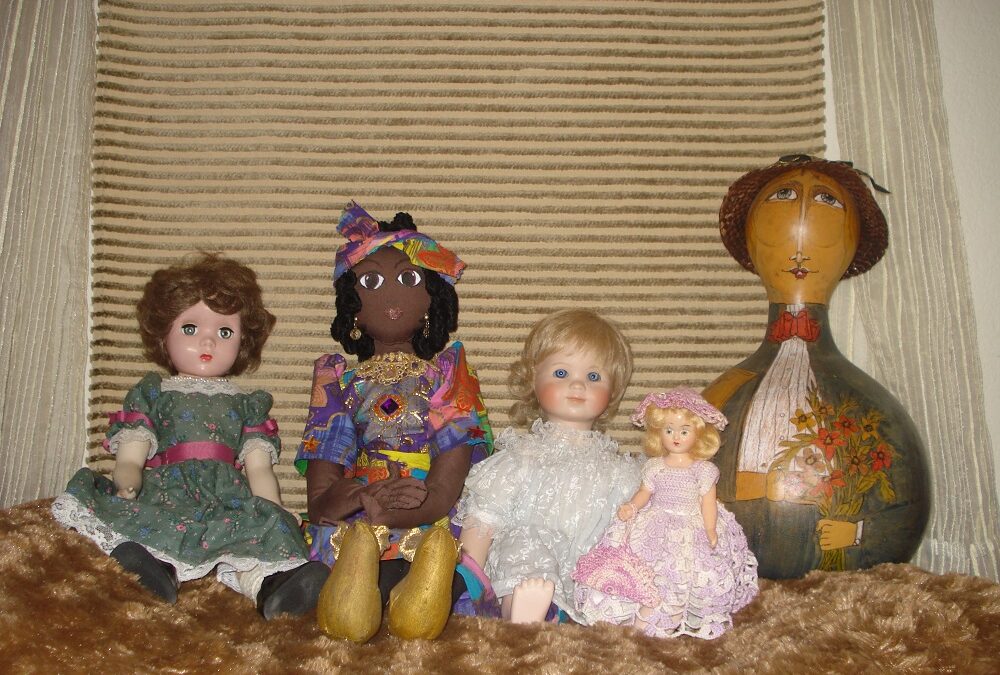
by wp-admin | Dec 9, 2021 | Exploring the Mental Fitness Formula
The deepest principle of human nature is the craving to be appreciated. (From the Dale Carnegie Course, 1976)
Here’s a new take on compassion and assertiveness! For a stronger Adult, a wiser Wise Parent and a more secure Child, consider the story of “Compassion, Assertiveness and the Pop-Bead Puppy.”
As I sat feeling exhausted in my doctor’s sunny waiting room, an older man holding a string of gold-colored pop-beads came over to me. He said “I want to give you something.” I was touched by his kind, gentle manner and invited him to sit next to me. Before retiring he’d traveled all around Louisiana working for Carpenter Tractors. Gradually he’d discovered that what he loved best to do was “put a smile on a someone’s face.” He said giving tiny pop-bead animals to people was his way to do that and he twisted the golden beads into a puppy for me.
I asked the Bead Man what he did when people got annoyed and treated him like he was trying to do something harmful to them. His face darkened and he said, “That’s bad.” After a moment he added, “but I know He (pointing upward as his face brightened) knows what I’m doing. I shared with him how I’d spent my life trying to find ways to do the same thing. I thanked him and as he left we laughed about how we both “just couldn’t get enough of those wonderful smiles.” This left me to ponder the issue of how humans react to what others offer them.
This gentle man felt really bad when people turned their eyes and hearts away from him as though he were panhandling for loose change. He wanted so much for people to give his gift a chance and could only keep going because he believed that a Higher Power recognized and appreciated him every time. Let’s consider what his motives might have been to perform this unusual behavior. Was he really panhandling for something else that would take from others much more than it gave? We’d call that self-serving and turn away. We could stay open to a friend who did that for a while, but not a stranger. Perhaps we’d fear that if we “gave him an inch, he’d take a mile,” and try to expand the contact into asking, say for a meal or a donation or more listening than we wanted to offer.
The Bead Man told me he just did this to see me smile. Why would he want to do that? He could be one of Elaine Aron’s HSP’s with “sensory processing sensitivity,” whose mirror neurons in their brain get more excited by smiles than the other 80% of the population, so he’d just be sharing what he loves. Chefs, artists, car dealers and most of the rest of us like to do that with others who enjoy the same things. They learn not to take rejection of their gifts as a rejection of themselves and to accept that what they offer may have limited appeal. Finally, he may have found this as a way to somehow transform grief from his life, like the mothers whose children were killed by drunk drivers joined to form MADD, with profoundly rooted zeal and determination to keep fewer children from dying this way.
When someone offers you a gift with an extra urgency that could make you suspicious and turn away, try staying open and allow your Adult to consider thoughtfully where this earnest person is really coming from. Unless there could actually be life-or-death consequences, let your Wise Parent assure your Child that your assertive Adult can set effective limits as needed. Remember that all of us want recognition and appreciation from each other, whatever our styles and the gifts we offer. You may find a kindred spirit along the way to brighten the path of your journey and soothe the pain we all find as we travel.

by wp-admin | Dec 8, 2021 | Exploring the Mental Fitness Formula
The previous post described how a worker might assume that a co-worker would see a situation the way he did and might have also believed that his managers would agree with and support him. When these expectations weren’t met he might enter the grief process. We call it empathy when people do understand each other’s point of view and feelings. But it’s a mistake to assume that we or others can do this accurately. It’s important for your Adult/Wise Parent team to know that your human nature is biased against differences. Then you can expect that it will take time and effort to get to know another person, before you assume anything about him. This will prevent a lot of disappointment and grief.
When your Adult can recognize your own biases against others who are different, it has a head start in your relationships. This knowledge alone can help reduce the power of your Toxic Beliefs. You’ve probably seen dogs or cats in fight-or-flight when they encounter an animal they consider different. When humans were evolving, it’s likely that offspring who couldn’t keep up were rarely protected at the expense of the tribe. Different tribes might have often been hostile and dangerous. Perhaps some of these might have been a human sub-species or otherwise look different in ways that were considered threatening. Because of how widespread human antagonism is toward those who seem different, it’s likely it had survival value sometime in our past.
Today we still see in our newspapers that fight-or-flight on a large scale happens between groups with differing religious beliefs, races, ancestors or tribes, customs, accents, gender identities, social status or amounts of wealth. I’ve described how people with different brain wiring must struggle to make their way in the larger society. Fitting in is close to a matter of life or death, to get a job, have a family or relax in your neighborhood. Young gay people and soldiers changed by war trauma often kill themselves because they can’t find a way to join in to our society. Poverty causes other divisions. Some turn their backs on those less fortunate as they struggle to climb the ladder of success, with varying degrees of compassion or guilt. The poor may develop a culture of distrust after too many set-backs overwhelm them.
It can give you peace to have your Adult remain aware of this bias as you cope with others. Anxiety about whether someone accepts or rejects you comes from your Parent’s warning that it’s dangerous not to have their approval. If you’re different from another person in ways they can notice right away, their human bias will probably push them to keep their distance. In that case, your Adult can keep your Parent and Child out of fight-or-flight by reminding them that Belief #1, that you must have the approval of any particular person, is false. When your Adult can keep you open to accepting what the other person offers, it will be more possible for time together and gradual comfort with your differences.
It’s sobering and calming to recognize your own tendency to over-react to others’ differences. You’ll be less likely to embrace Belief #3, that you or others should meet some set of expectations or suffer blame and punishment. Your Adult can’t be alert enough for you to escape entirely this human bias against people who are different. You may be fine with racial differences, but not religious. You may be repulsed by a homeless person or offended when a person expresses a cultural difference. You may be tempted to condemn those who haven’t provided as well for themselves as you have, and shun them to enjoy the company of wealthier people in your gated community.
This bias against those who are in some way different from us is a reality of your human nature that you must avoid denying. You need to grieve it all the way through, and accept it that it exists for both yourself and others. Then you’ll be happiest when you can transform this disturbing trait into a life-long challenge to overcome its influence. Polarized attitudes can lose some of their heat when you can have compassion instead of angry judgment for people who express this bias without realizing it. It’s a benefit of mental fitness to be able to help others discover this about themselves and re-set their relationships. You may have a future in the United Nations!
It’s time for humans to recognize this along with the other ancient wiring of our human nature. We need to live into our present, more evolved potential to solve human problems without automatic leaps into fight-or-flight over the differences between us.


